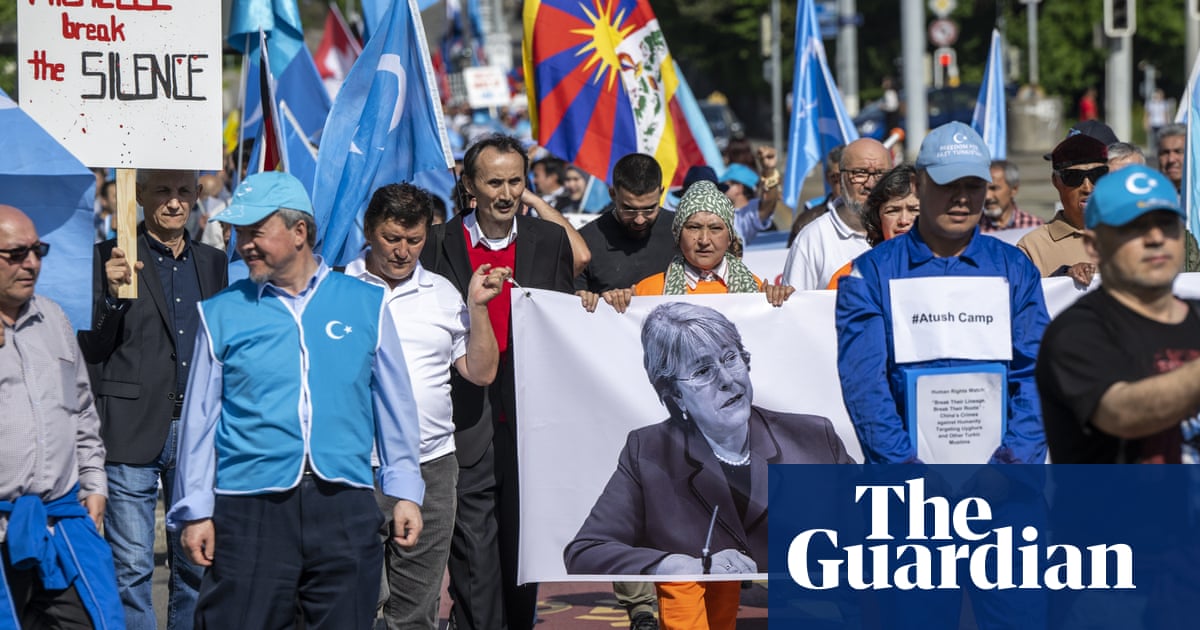
A group of 40 politicians from 18 countries have told the UN high commissioner for human rights that she risks causing lasting damage to the credibility of her office if she goes ahead with a visit to China’s Xinjiang region next week.
Michelle Bachelet is scheduled to visit Kashgar and Ürümqi in Xinjiang during her trip, which starts on Monday. Human rights organisations say China has forced an estimated 1 million or more people into internment camps and prisons in the region. The US and a number of other western countries have described China’s treatment of the Uyghur minority living there as genocidal, a charge Beijing calls the “lie of the century”.
In a statement seen by the Guardian before its publication, the politicians from the InterParliamentary Alliance on China (Ipac) accused Beijing of organising a “Potemkin-style tour”. In particular, they said they feared the government would use the cover of coronavirus restrictions to prevent the visit from being as free as it needed to be.
The group includes six politicians under Chinese government sanctions, including Reinhard Bütikofer, the German Green MEP and chair of the European parliament’s China delegation; Helena Kennedy, the Labour peer; and Iain Duncan Smith, the former Conservative party leader.
The politicians highlighted the UN terms of reference for such visits, which specify that the commissioner should be given freedom of movement, conversations with people active in civil society and confidential and unsupervised access to witnesses, all of which could be undermined by China’s crackdown in the region and its Covid-19 restrictions.
As such, they said, it was hard to envisage a scenario where a meaningful visit could be achieved.
Bachelet has demanded unfettered access on what will be the first visit to China by a human rights chief since 2005. It follows intense negotiations with the Chinese government lasting months over the terms of her access.
Rights groups have cautioned that the terms of the visit have not been disclosed and voiced concern that Chinese authorities, who have always said they were only interested in a “friendly visit”, could manipulate the trip.
Alleged human rights abuses in the Xinjiang Uyghur autonomous region include forced labour, forced sterilisation and the arbitrary detention of at least a million Uyghur Muslims. Beijing has vehemently denied all these allegations and blamed “anti-China forces” for stoking controversy.
Ipac said: “The scale and severity of the persecution of Uyghurs and other minorities is exceptionally well documented. Indeed, the high commissioner herself has prepared a report into the situation which remains unpublished, despite assurances in December 2021 that it would be released ‘within a few weeks’. The stakes are therefore very high.
“Should the high commissioner fail to obtain the necessary access for a meaningful investigation, the credibility of the office could suffer lasting damage, and the ability for the UNHCHR to secure meaningful future investigations may well be compromised. Covid restrictions must not be deployed as a reason to excuse the PRC [People’s Republic of China] for failing to allow a meaningful investigation.”
Activists say China has violated human rights “on a scope and scale unimaginable” since the then UN human rights commissioner, Louise Arbour, visited more than a decade ago.
“[This is] partly because there is no fear of accountability,” said Sophie Richardson, China director at Human Rights Watch. “The high commissioner needs to work to end, not enable, that perception.”
According to Bachelet’s official schedule, she will meet civil society organisations, business representatives and academics in China. She will also deliver a lecture to students at Guangzhou University.
An advance team was sent to China late last month and completed a lengthy quarantine in the country, which is in the midst of another coronavirus outbreak. Bachelet will not need to quarantine upon arrival. Her office said she would not travel to Beijing because of Covid-19 restrictions. At the end of her mission a statement will be issued, and she is scheduled to hold a press conference on 28 May. No international journalists will be allowed to travel with her.
Bachelet’s trip will be closely followed by Beijing as well as by the international community. Last week, in a report to Congress, the US state department outlined plans to intensify pressure on China to end what it called “horrific abuses” of Uyghur and other minority ethnic people in Xinjiang.







